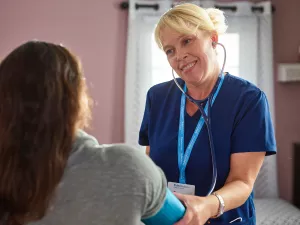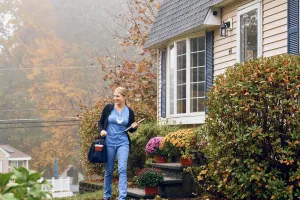If you or a loved one is entering the final chapter of their life, you can count on our hospice care team to deliver the comfort, dignity and peace that you deserve—either within our doors or at home.
You’re more than your prognosis
Nearing the end of life touches us all in different ways. Yet, it's important to remember that a life doesn't end the day you or a loved one receives a prognosis of 6 or fewer months to live.
Our hospice care team will help you cherish the remaining time you have by putting comfort and quality time first. We'll combine expert symptom and pain management with innovative techniques like expressive therapy, which helps you get things off your chest when words aren't enough. And if you ever have questions or just need to talk, we'll be there for you.

Conditions
Hospice care is designed to help people living with any condition that isn’t responding to treatment, as well as people who have chosen to no longer receive treatment. That may include, but isn’t limited to:
Treatments
Hospice isn’t a place—it’s a philosophy. We’ll always meet you where you are to deliver care on your terms. That can mean treatment from the comfort of home, a skilled nursing facility or assisted living community.
Your hospice care team
Hospice care takes a village, and you deserve a village of experts. Together, we’ll work to ensure that you and your loved ones have all needs covered during this time.
Your physician works hand-in-hand with your primary care doctor to craft the most comfortable treatment plan for you. They’re responsible for keeping a close eye on your condition, and making adjustments to your hospice care as necessary.
Your team of registered nurses take the day-to-day lead on your care. They’ll make regular visits to your home or facility to deliver personalized pain and symptom management.
When tasks like getting dressed, bathing and meal prep become too much to bear, hospice aides will by your side to lend a helping hand. All of our aides are trained or certified to provide compassionate hospice care.
How we care for you
Everyone’s hospice care journey is different. Whether you need pain and symptom control, emotional support, a helping hand during the grieving process or all the above, we’ll create a plan tailored to you and your loved ones’ needs.
Emotional + spiritual services
Transitioning into hospice care, or watching someone you love make that transition, brings on a wave of emotions. We’re here to help you navigate those waters with comprehensive mental health resources.
If you consider yourself spiritual, our chaplains offer multi-denominational support and help keep you connected to your own religious community.
Expressive therapy services
Expressing yourself creatively can help heal the scars that people can’t see. We offer a safe and judgment-free environment to try things like:
- Art
- Journaling
- Music
- Reiki
- Sand therapy
Bereavement support
We’ll be here for families and loved ones to work through the difficult feelings that come with losing someone. Bereavement services are available for 24 months following a loss, and feature support such as:
- 1-on-1 and group counseling
- Community-based support groups
- Memorial services in nursing homes, assisted living and other facilities
FAQs
No. While palliative care and hospice care both focus on supporting people facing serious illnesses, there are some key differences between them.
Hospice care provides end-of-life comfort and support for patients living with an advanced illness with 6 or fewer months to live, or who have chosen not to pursue further treatment.
On the other hand, palliative care supports patients and families managing the symptoms and burdens of an illness, no matter where they are in their treatment journey.
People can receive hospice services indefinitely, for as long as your care team is seeing a decline in your condition. We’ll check in periodically to see if that’s the case.
If you decide that you want to restart treatment, you can do so at any time, without penalty. You may also restart hospice services at any time, as long as you meet the criteria determined by your care team.
Yes. If the patient’s condition improves, they can be discharged from hospice and return to aggressive therapy or even normal living. If the patient needs hospice care at a later date, the patient can be re-admitted to hospice.
Hospice care doesn’t speed up or slow down the end-of-life process. It only provides comfort and resources for people in the final stages of life and their loved ones.
We believe that it’s our duty to serve those that have served in the military. We’re a part of the We Honor Veterans program, a collaboration between the National Hospice and Palliative Care Organization and the Department of Veterans Affairs.
This program unites hospice professionals across the country to focus on a single purpose: providing comfort and support to veterans at the end of their lives.

From regular office visits to inpatient stays, find the healthcare you need and deserve close to home.

Meet the doctors and care team devoted to supporting you every step of the way along your path to better health.